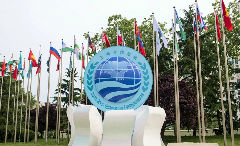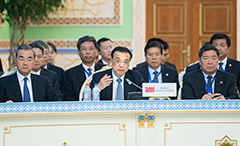Six SCO member countries reaffirm support for Belt and Road Initiative
2018-10-14
cgtn.cn
Prime ministers of the member states of the Shanghai Cooperation Organization (SCO) gathered in Tajikistan’s capital Dushanbe on Oct 11 for their annual meeting to discuss the organization’s development, with mutual understanding and traditional friendship strengthened.
In a joint communique issued on the outcomes of the meeting, SCO member countries Kazakhstan, Kyrgyzstan, Russia, Tajikistan, Uzbekistan and Pakistan reaffirmed their support for China’s Belt and Road Initiative, advocating the creation of a broad, open, mutually beneficial and equal partnership in the SCO space.
Established in 2001, the SCO has significant potential, and its role and influence expanded after the accession of India and Pakistan as full members in 2017.
The SCO prime ministers agreed to deepen and expand cooperation as well as to explore significant potential in the fields of politics, security and trade.
They were committed to the further implementation of various SCO strategies including the agreements reached during the 18th SCO Summit held in June this year in eastern China’s Qingdao.
The SCO countries also stressed the importance of people-to-people cooperation, which brings numerous benefits to the people of the SCO member states.
Considering the current international trade challenges such as the rising of unilateralism and protectionism, the member states agreed to promote the construction of new international relations based on mutual respect, equity and justice, and win-win cooperation, as well as the formation of a common vision of creating a community of a shared future for mankind.
The SCO countries supported the further improvement of global economic governance, agreeing to further deepen cooperation to jointly build an open world economy.
The prior direction for SCO development is to jointly create favorable conditions for the expansion of trade, economic and investment activities, according to the communique.
SCO countries should develop high-tech sectors of the economy and modernize various industries to improve their economic competitiveness and bridge the technological gaps between them, the document said.
The heads of government also underlined the importance of further developing cooperation in a wide range of fields including culture, healthcare, education, science and technology, tourism, environment protection, mass media and sports.



